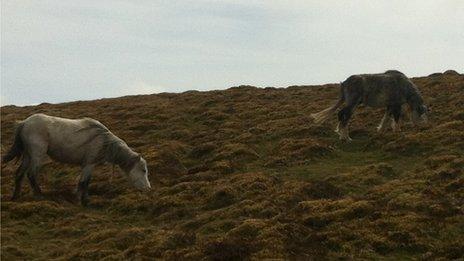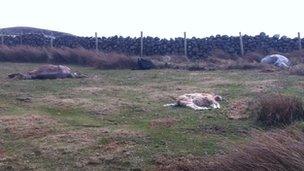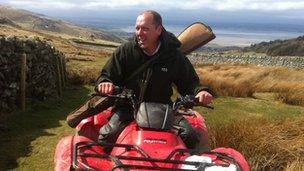Bad weather kills half of Welsh wild pony herd
- Published

The Welsh mountain ponies play an important role in sustaining the diversity of plants, insects and birds on the fragile landscape
Farmers who monitor a herd of about 200 wild ponies on hillsides in north Wales believe up to half of them have died during the harsh spring weather.
Only now is the loss coming to light, as the snow melts across the Carneddau mountains.
Many of the mares were about to give birth, and both mothers and foals have been killed.
"It's an absolute disaster," said Gareth Wyn Jones, Secretary of the Carneddau Mountain Pony Society
The Welsh government has allowed a brief moratorium, ending on Monday, to allow farmers to bury dead animals on their land because of the extreme weather.
"The numbers of the dead are coming in like crazy," he added, "It's heartbreaking. We're up to about 50 or 55 now, and when you look around you - these mountains are vast - we're at the tip of the iceberg. I think it will be 100 plus.
"There's a management agreement for 220 ponies on the mountain. It would be a great shame for half of them to be wiped out overnight."
Terrible conditions
The BBC accompanied wardens from the Snowdonia National Park, as they joined farmers this week to assess the scale of the losses.
On Thursday, many of the bodies of ponies were buried on the mountain above Llanfairfechan because they were lying close to well-trodden areas on the north Wales coastal path. Others, in more remote areas, will be left as carrion for the birds and foxes.

The ponies have been living on the mountains for thousands of years
"On the path people are going to come across them," said Dewi Davies, senior warden for the northern sector of the national park. "They are very upsetting. We've seen mares in the middle of giving birth and both the foal and the mare have died. It's going to be distressing for people to see that.
"You accept to a certain degree that nature is cruel, but it's the sheer number of cases where this has happened up here."
There were bodies of many ponies in family groups, huddled in gullies or behind walls where they had tried to shelter from the terrible conditions. Unfortunately, these were the same areas where snow drifted, burying the ponies under many feet of snow.
The ponies have been living in the Carneddau Mountains for thousands of years. They are short, stocky creatures and are well used to harsh conditions. But the severity of the snowfall and sub-zero temperatures was exceptional. Hill farmers lost thousands of sheep and lambs too.
The Welsh mountain ponies play an important role in sustaining the diversity of plants, insects and birds on the fragile landscape. They keep the vegetation low in the winter when the sheep are brought down to lower levels, and they provide food for birds like choughs.
Resilient creatures
Members of the Carneddau Mountain Pony Society round the ponies up once a year to check on numbers and prevent inbreeding. Many of them have been tagged or micro-chipped.
"They roam free on these hills and have done for generations," explained Mr Wyn Jones, "They go back to the Celtic times. They are a special breed, and I think a lot of the horses in England and Wales started from these, these are the gene pool for thousands of different breeds."

Mr Wyn Jones says it might have been some kind of 'natural cull'
Walking across the hillside we came across one young mare which had collapsed on her side, still alive, but clearly very weak. We tried to get her back on her feet but she was unable to stand. She appeared to have broken a leg, and sadly had to be put down.
It was a sign that although the immediate crisis with the cold weather is over, its effects are still continuing on a severely-weakened herd of horses.
The national park authorities brought in archaeologists to advise on where to bury the bodies of the ponies. The area is of great historical importance, with sites dating back to Neolithic times, up to 5,000 years before Christ. There are bronze-age stone circles and the remains of iron-age settlements.
The farmers are hopeful that despite the loss of up to half of the horses, those that remain will go on to form the nucleus of an even tougher breed.
"It might be some type of natural cull," said Mr Wyn Jones, "The ones who are left are special; they are resilient. They've lived through a natural disaster and survived."
"Nature is cruel but it can be kind. Is it nature's way of keeping these ponies up here? It's a cycle that happens every 50 or 60 years, and just takes the weak, the young, and the old out and the ones we've got left are very special, powerful beautiful ponies."
- Published17 April 2013
- Published30 March 2013